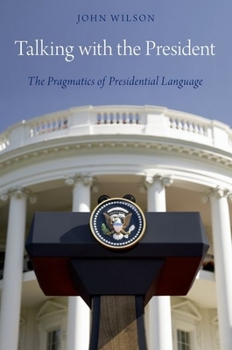Talking with the President: The Pragmatics of Presidential Language
Select Format
Select Condition 
Book Overview
This book provides a pragmatic analysis of presidential language. Pragmatics is concerned with "meaning in context," or the relationship between what we say and what we mean. John Wilson explores the various ways in which U.S. Presidents have used language within specific social contexts to achieve specific objectives. This includes obfuscation, misdirection, the use of metaphor or ambiguity, or in some cases simply lying. He focuses on six presidents: John F. Kennedy, Richard M. Nixon, Ronald W. Reagan, William F. Clinton, George W. Bush, and Barack H. Obama. These presidents cover most of the last half of the twentieth century, and the first decade of the twenty first century, and each has been associated with a specific linguistic quality. John F. Kennedy was famed for his quality of oratory, Nixon for his manipulative use of language, Reagan for his gift of telling stories, Clinton for his ability to engage the public and to linguistically turn arguments and descriptions in particular directions. Bush, on the other hand, was famed for his inability to use language appropriately, and Obama returns us to the rhetorical flourishes of early Kennedy. In the case of each president, a range of specific examples are explored in order to highlight the ways in which a pragmatic analysis may provide an insight into presidential language. In many cases, what the president says is not necessarily what the president means.
Format:Paperback
Language:English
ISBN:0199858799
ISBN13:9780199858798
Release Date:April 2015
Publisher:OUP Us
Length:288 Pages
Weight:0.94 lbs.
Dimensions:0.7" x 6.5" x 9.1"
Customer Reviews
0 rating





